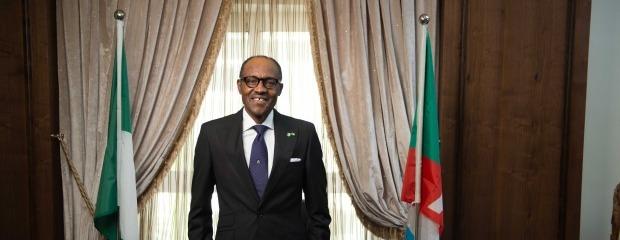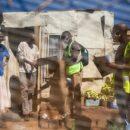Obama Cannot be Our Saviour: We Should Decide to Save Ourselves
 It will be difficult to discuss anything this week but the inauguration of the first black man to be elected President of the United States of America. It is an election that is resonating with historical symbolisms and promises of new beginnings and great expectations. A nation whose wealth was built on genocide of the indigenous peoples and slavery of Africans has elected, not a direct descendant of these slaves, but a descendant of the enslaved peoples as its president. America does not disguise its white hegemony which it proclaims more symbolically in the name given to its seat of power: The White House. Now that house, built by slave labour and proceeds of slavery, is to have a black man calling the shots. Talk of poetic justice and the empire striking back.
It will be difficult to discuss anything this week but the inauguration of the first black man to be elected President of the United States of America. It is an election that is resonating with historical symbolisms and promises of new beginnings and great expectations. A nation whose wealth was built on genocide of the indigenous peoples and slavery of Africans has elected, not a direct descendant of these slaves, but a descendant of the enslaved peoples as its president. America does not disguise its white hegemony which it proclaims more symbolically in the name given to its seat of power: The White House. Now that house, built by slave labour and proceeds of slavery, is to have a black man calling the shots. Talk of poetic justice and the empire striking back.
But beyond the symbolism and the historical proportions of Obama’s remarkable ascendancy to the Presidency of the USA, there are many challenges. One’s disappointments are usually directly proportional to one’s expectations. Obama is not a messiah, even though that is what many expect him to be. He cannot solve all the problems of the world. He cannot even solve all the problems of America. However, potentially his election gives both Americans and the rest of us a chance to look at things afresh and probably find a solution that we can all live with, even if it may not be perfect.
During a Presidency replete with all kinds of havoc both internally and internationally, one of the worst things that George W. Bush did to America and the world, was to make unilateralism on all issues his default position. Even where other countries may have agreed with him, he made it difficult by insisting that he would have his way whatever others thought. The world was very simple to him: “˜You are either for us or against us’. But even the powerful need friends. The expectation of many peoples across the world is that Obama will listen more and lecture or hector less. America cannot bomb all its enemies, real or imagined. Military might alone cannot win hearts and minds. That strategy made George Bush the effective Organising Secretary for Al Qaeda, winning it many converts. Countries that did not have terrorists quickly become breeding grounds for them the moment Bush came along. Obama has to ask himself why so-called “˜terrorists’ come predominantly from countries whose leaders are allies of America.
There are other areas where Obama has to pursue a policy change that we can believe in. The illusions of many in the Middle East are already dampened by the loud silence of the President-Elect over Gaza. When terrorist bombings were inflicted on Mumbai residents he was quick to condemn it but when it came to Gaza, he claimed there was only one President at a time. For a candidate and President elect that had opinion on everything, maintaining silence over Gaza merely showed the heavyweight of Zionist influence in American Middle East policy. If he really wants to make a difference he needs to redress the balance in favour of a just lasting solution. For now America is not an honest broker because it is on the side of Israel, right or wrong. His campaign declaration that “˜the security of the state of Israel is sacrosanct’ means a continuation of the Israelisation or Zionisation of US Policy, and more conflict. He needs to use his leverage to convince Israel, that like America, it cannot bomb all its enemies into submission.
Finally, Africa may be more disappointed than most regions because our expectations spread from government houses down to the streets. Markets, beer parlours, matatu or Danfo drivers to street hawkers; hopes are just too high. Obama is not our saviour. Our capacity to leverage anything from Washington beyond good intentions will depend on how clear we are in terms of our own interests. We should deal on a Pan African multilateral level instead of lining up as Obama’s “˜bestest’ country or ally. Maybe the biggest disappointment will be in Kenya. One other area we can benefit from is Obama’s commitment to the Millennium Development Goals. Multilateralism is better than bilateralism which often shores up our dictators.
One thing may change with Obama: African leaders who guilt-trip western leaders for being interfering colonialists may have to find other default responses. Many of them who acted as Bush’s henchmen in Africa are worried about Obama. Therefore he has to avoid the well-meaning liberal patronage offered by the Clinton Administration in Africa. Many of Clinton’s friends in our State Houses graduated to becoming even closer allies of Bush. If Obama chooses the easy option of relying on Clinton’s men and women for his Africa policy, as many of his key appointments have indicated so far, then Africa should be prepared for an early rude shock in Africa-US relations.
Meanwhile, enjoy the honeymoon and celebrations. If nothing changes under Obama, we cannot take one thing away from him: he has made hope and the possibility of change more desirable. The Obamas of America may be inspiration for other Obamas in Africa and across the world. Change is no longer a dirty word and those who say “˜No change’, had better be on notice.







Knowledge is power and also a cost saving tool for the future. Read my sig for more info on getting faster more efficient and targetted search results with one simple step.